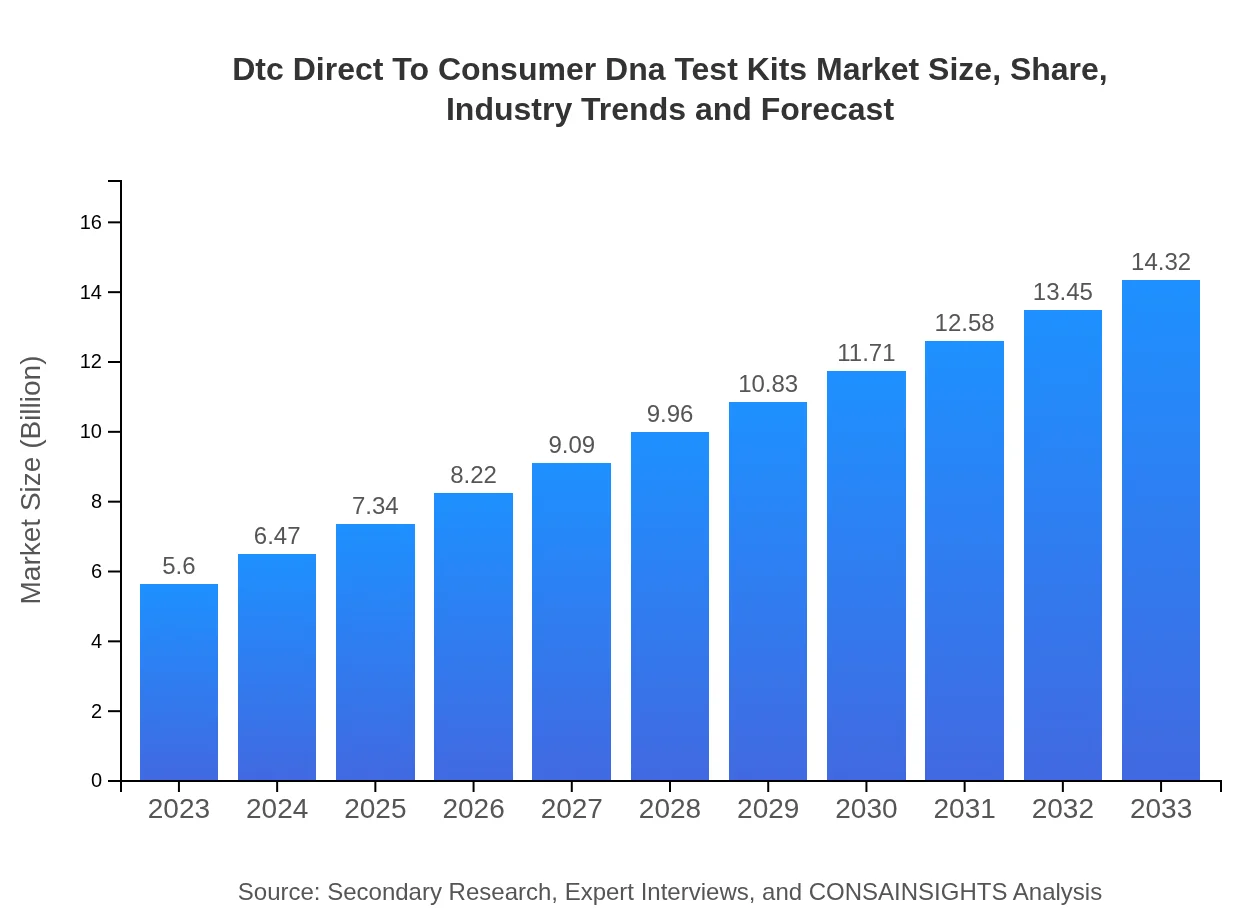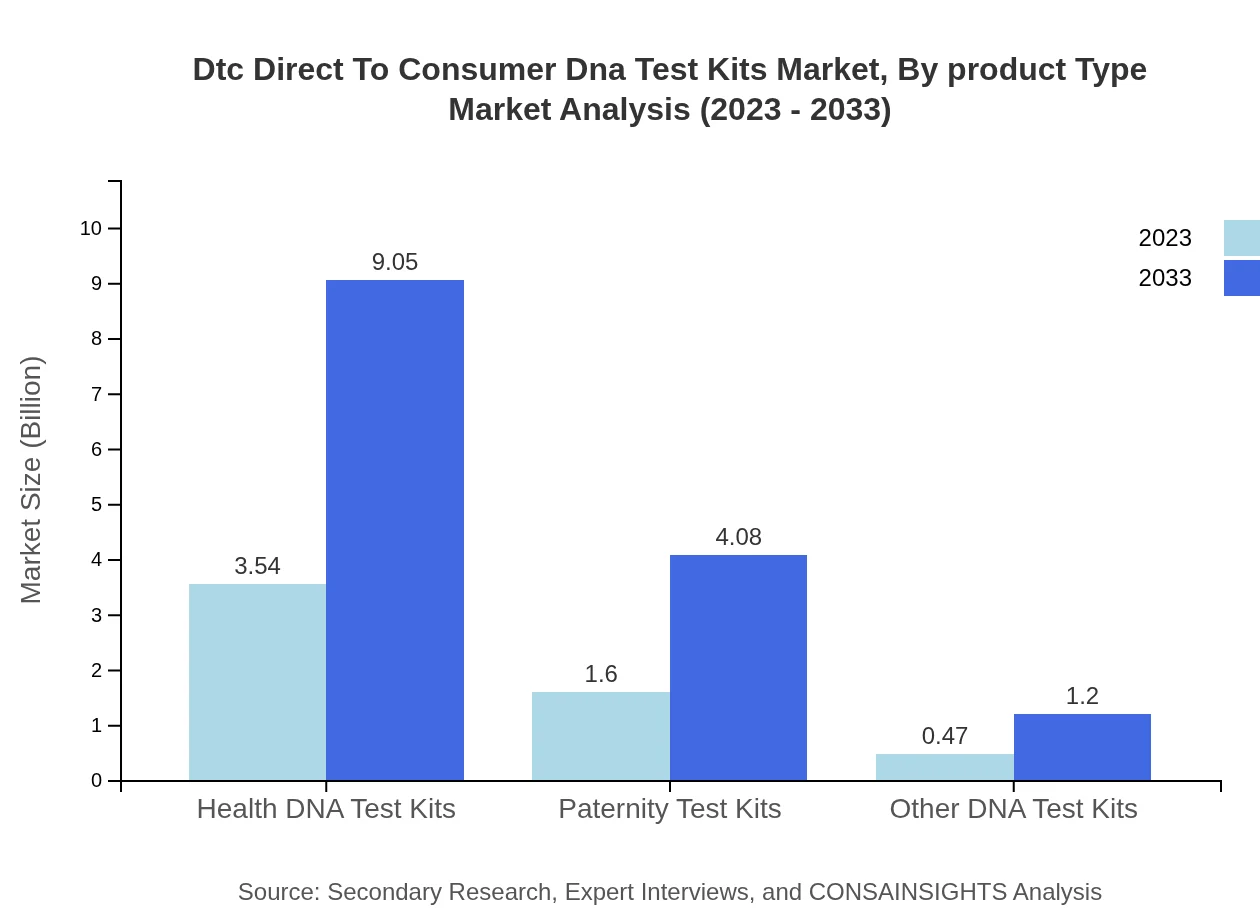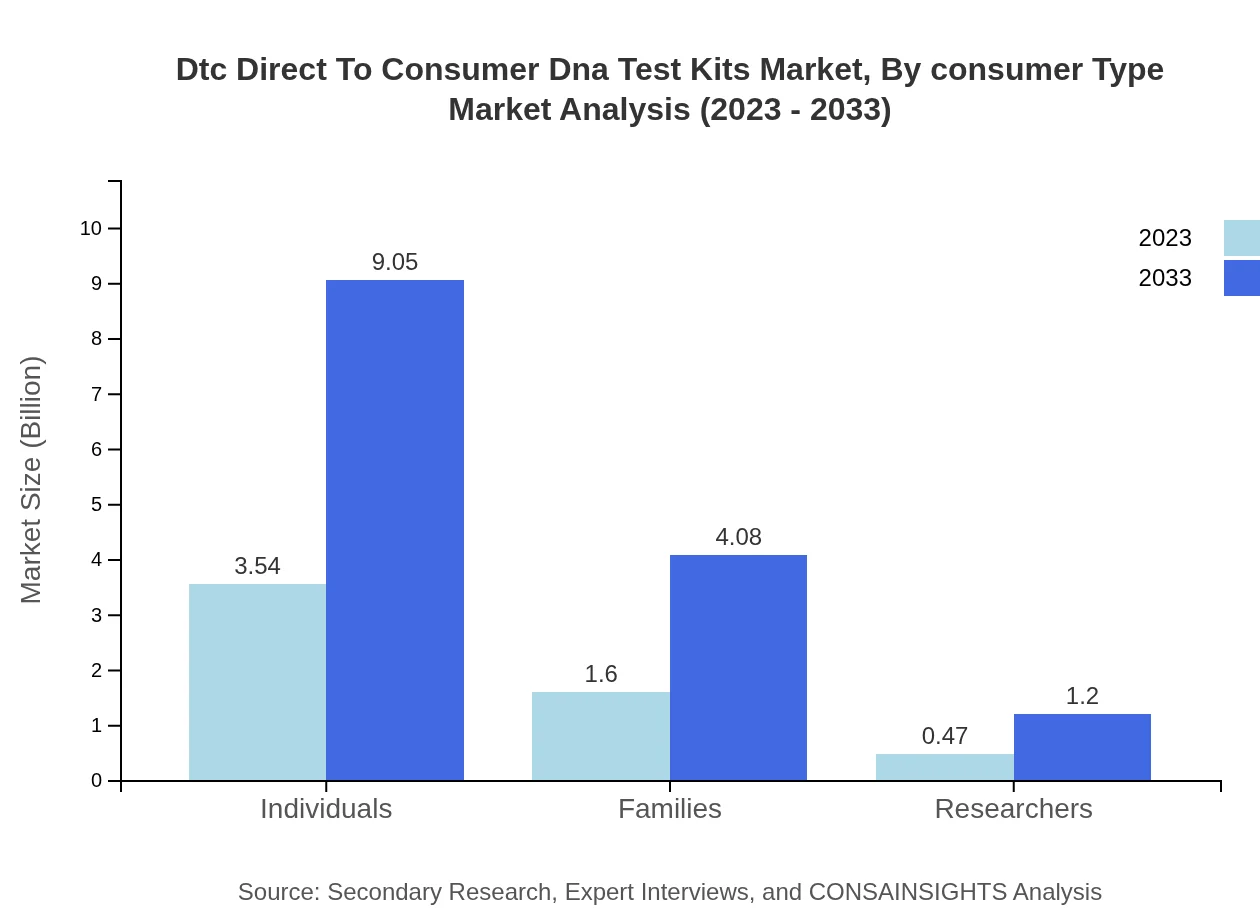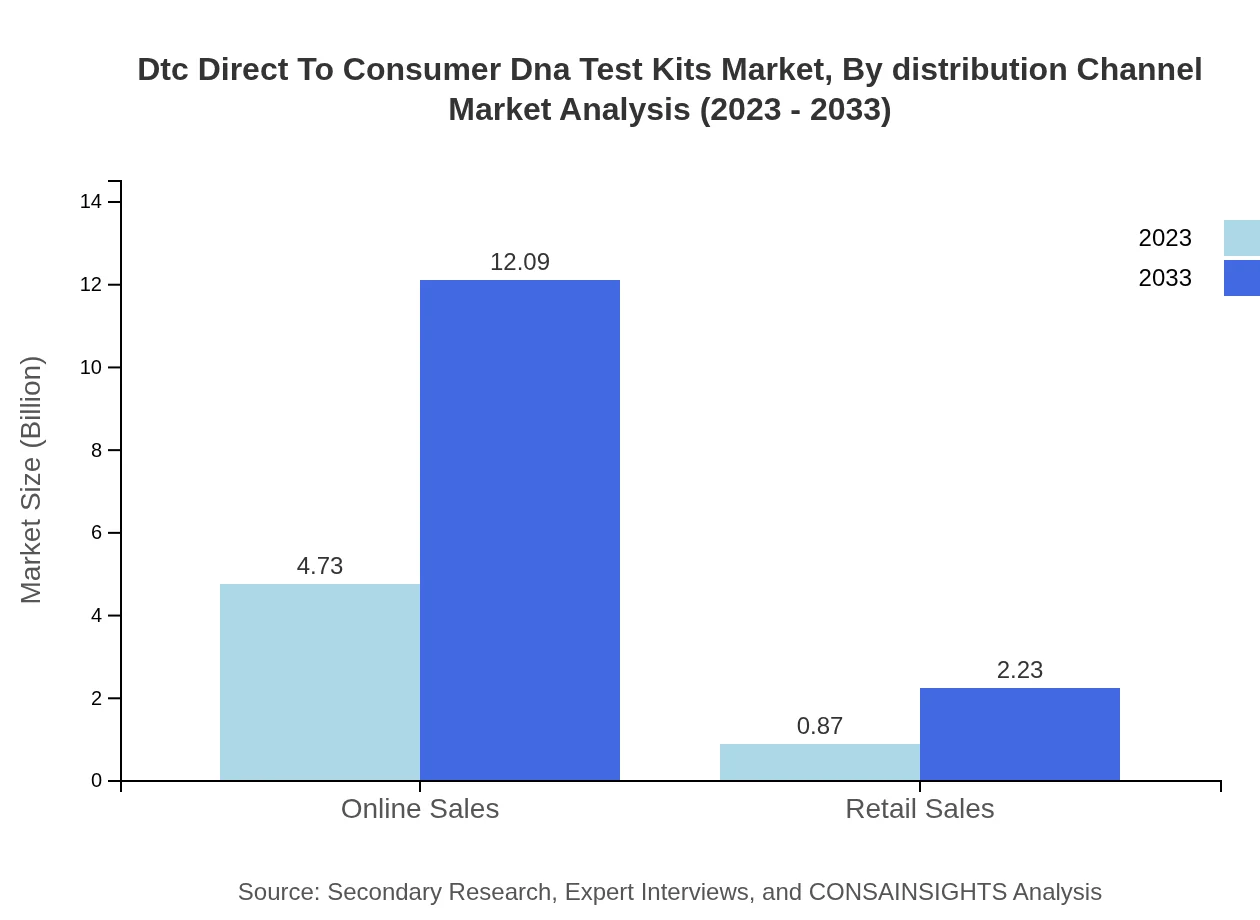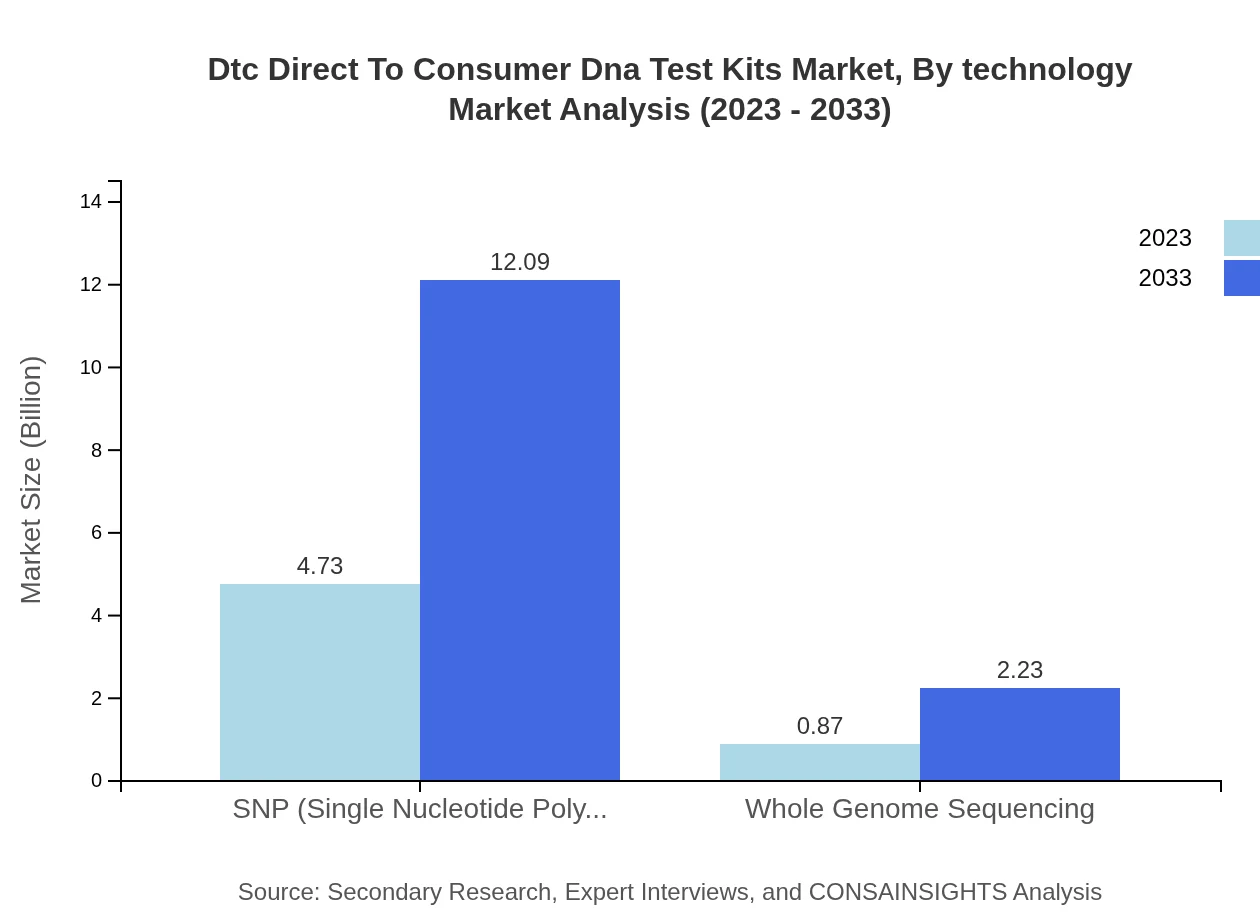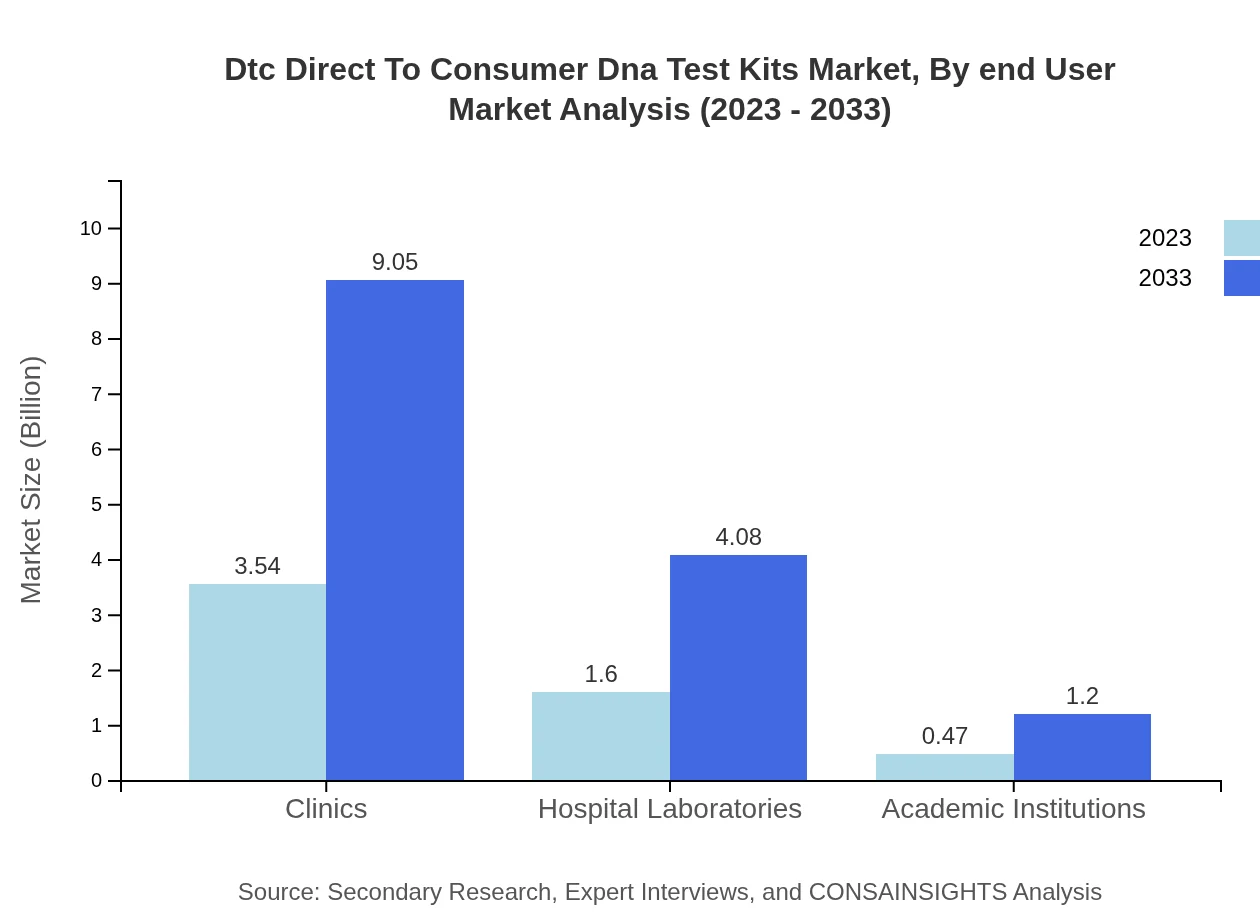Dtc Direct To Consumer Dna Test Kits Market Report
Published Date: 31 January 2026 | Report Code: dtc-direct-to-consumer-dna-test-kits
Dtc Direct To Consumer Dna Test Kits Market Size, Share, Industry Trends and Forecast to 2033
This report provides a comprehensive analysis of the DTC Direct to Consumer DNA Test Kits market, outlining market size, segmentation, regional analysis, technology trends, and forecasts for the years 2023 to 2033. Key insights into market dynamics and growth potential are presented.
| Metric | Value |
|---|---|
| Study Period | 2023 - 2033 |
| 2023 Market Size | $5.60 Billion |
| CAGR (2023-2033) | 9.5% |
| 2033 Market Size | $14.32 Billion |
| Top Companies | 23andMe Inc., Ancestry.com LLC, MyHeritage Ltd., Color Genomics, Veritas Genetics |
| Last Modified Date | 31 January 2026 |
Dtc Direct To Consumer Dna Test Kits Market Overview
Customize Dtc Direct To Consumer Dna Test Kits Market Report market research report
- ✔ Get in-depth analysis of Dtc Direct To Consumer Dna Test Kits market size, growth, and forecasts.
- ✔ Understand Dtc Direct To Consumer Dna Test Kits's regional dynamics and industry-specific trends.
- ✔ Identify potential applications, end-user demand, and growth segments in Dtc Direct To Consumer Dna Test Kits
What is the Market Size & CAGR of Dtc Direct To Consumer Dna Test Kits market in 2023?
Dtc Direct To Consumer Dna Test Kits Industry Analysis
Dtc Direct To Consumer Dna Test Kits Market Segmentation and Scope
Tell us your focus area and get a customized research report.
Dtc Direct To Consumer Dna Test Kits Market Analysis Report by Region
Europe Dtc Direct To Consumer Dna Test Kits Market Report:
In Europe, the DTC DNA Test Kits market is expected to grow from $1.54 billion in 2023 to $3.95 billion by 2033. Privacy regulations and rising consumer interest in genetic health enhance market performance, with the UK, Germany, and France leading in adoption rates.Asia Pacific Dtc Direct To Consumer Dna Test Kits Market Report:
The Asia Pacific region is experiencing steady growth, with the market valued at $1.08 billion in 2023 and projected to reach $2.75 billion by 2033. Increased internet penetration and a growing middle class are driving demand for DTC DNA Test Kits, particularly in countries like China and India, where health and wellness trends are on the rise.North America Dtc Direct To Consumer Dna Test Kits Market Report:
The North American region is anticipated to hold the largest market share, valued at $2.11 billion in 2023, with projections reaching $5.40 billion by 2033. High consumer interest in personalized health solutions and a strong focus on genetic research drive this growth, particularly in the U.S., where a significant number of companies operate.South America Dtc Direct To Consumer Dna Test Kits Market Report:
In South America, the DTC DNA Test Kits market is valued at $0.11 billion in 2023 and expected to grow to $0.29 billion by 2033. Factors such as improved healthcare access, rising disposable incomes, and health awareness campaigns contribute to this market's development, particularly in Brazil and Argentina.Middle East & Africa Dtc Direct To Consumer Dna Test Kits Market Report:
In the Middle East and Africa, the market size is estimated at $0.75 billion in 2023, projected to grow to $1.93 billion by 2033. This growth is driven by increasing awareness about genetic health and advancements in technology, particularly in urbanized regions.Tell us your focus area and get a customized research report.
Dtc Direct To Consumer Dna Test Kits Market Analysis By Product Type
SNP (Single Nucleotide Polymorphism) tests dominate the market, representing 84.41% share in 2023 with sizes of $4.73 billion, projected to reach $12.09 billion by 2033. Health DNA test kits hold a similar share at 63.16% with sizes totaling $3.54 billion in 2023, expected to rise to $9.05 billion by 2033. Whole genome sequencing and other types such as paternity and ancestry tests contribute significantly to market diversity.
Dtc Direct To Consumer Dna Test Kits Market Analysis By Consumer Type
The consumer segment predominantly consists of individuals, accounting for 63.16% of the market share in 2023, which will rise from $3.54 billion to $9.05 billion by 2033. Families and researchers also form critical segments, capturing 28.49% and 8.35% shares respectively, with notable growth projections in forthcoming years.
Dtc Direct To Consumer Dna Test Kits Market Analysis By Distribution Channel
Online sales are the primary channel, commanding an 84.41% share in 2023, translating to $4.73 billion in market size, which is expected to soar to $12.09 billion by 2033. Retail sales, though smaller, still represent a vital channel for consumer engagement, growing alongside online channels with a projected increase from $0.87 billion to $2.23 billion.
Dtc Direct To Consumer Dna Test Kits Market Analysis By Technology
Technological advancements such as advancements in SNP testing and sequencing methods are pivotal in shaping the DTC DNA Test Kits market. Innovations resulting in reduced time-to-results and enhanced accuracy are further boosting consumer confidence. Technological integration into home-testing procedures continues to evolve, leading to improved user experience and accessibility.
Dtc Direct To Consumer Dna Test Kits Market Analysis By End User
End-users of DTC DNA test kits are categorized into individual consumers, families, and academic researchers. Individuals are the largest user group, with 63.16% market share in 2023, expected to grow significantly along with families and researchers. The rising trend of personalized health has increased the usage of DTC test kits, providing vested interests further operational scopes.
Dtc Direct To Consumer Dna Test Kits Market Trends and Future Forecast
Tell us your focus area and get a customized research report.
Global Market Leaders and Top Companies in Dtc Direct To Consumer Dna Test Kits Industry
23andMe Inc.:
A pioneer in the DTC DNA testing space, 23andMe offers health and ancestry reports and has compiled one of the largest genetic databases, enabling personalized insights.Ancestry.com LLC:
Known for its ancestry and family tree services, Ancestry also provides DNA testing kits, allowing users to explore genealogical connections and genetic health.MyHeritage Ltd.:
MyHeritage specializes in ancestry DNA tests and health reports, combining technology with vast historical records to help individuals trace their roots and make informed health decisions.Color Genomics:
Color Genomics provides health-focused genetic test kits aimed at identifying genetic risks for certain diseases, offering actionable insights and genetic counseling.Veritas Genetics:
Focused on whole genome sequencing, Veritas provides consumers with detailed genetic insights and supports personalized health management and decision-making.We're grateful to work with incredible clients.









FAQs
What is the market size of DTC Direct To-Consumer DNA Test Kits?
The DTC Direct-to-Consumer DNA Test Kits market size is currently valued at $5.6 billion. With a projected CAGR of 9.5%, the market is expected to grow significantly over the next several years, indicating robust consumer interest.
What are the key market players or companies in the DTC Direct To-Consumer DNA Test Kits industry?
Key players in the DTC DNA test kit market include Ancestry.com, 23andMe, MyHeritage, and others. These companies dominate the market with innovative genetic testing solutions and marketing strategies appealing to direct consumers.
What are the primary factors driving the growth in the DTC Direct To-Consumer DNA Test Kits industry?
Factors driving growth include increasing consumer awareness of genetic health, rising interest in ancestry and genealogy, affordability of testing kits, and advancements in genetic technologies, making DNA testing more accessible and appealing.
Which region is the fastest Growing in the DTC Direct To-Consumer DNA Test Kits?
The fastest-growing region for DTC DNA test kits is North America, projected to grow from $2.11 billion in 2023 to $5.40 billion by 2033, indicating strong regional demand and market expansion.
Does ConsaInsights provide customized market report data for the DTC Direct To-Consumer DNA Test Kits industry?
Yes, ConsaInsights offers customized market reports tailored to specific needs in the DTC DNA test kit industry. This includes detailed insights and analysis on market trends, consumer preferences, and competitive landscapes.
What deliverables can I expect from this DTC Direct To-Consumer DNA Test Kits market research project?
From this market research project, you can expect comprehensive reports featuring market size and growth forecasts, competitive analysis, segmentation data, consumer insights, and strategic recommendations tailored to the DTC DNA test kit sector.
What are the market trends of DTC Direct To-Consumer DNA Test Kits?
Key trends include increasing online sales channels, growth in health-oriented test kits, personalized genetic insights, and expanding consumer demographics. The sector is evolving rapidly with technological advancements and innovative marketing approaches.

